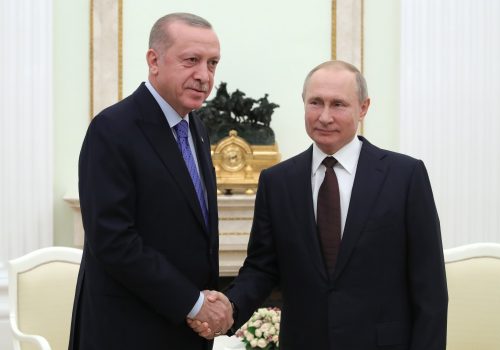Assad is testing Biden. The US president must not fail.
On the morning of March 21, artillery shells struck the Al-Atareb Surgical Hospital in northwestern Syria. The attack on the hospital—supported by the Syrian American Medical Society—killed six patients and injured seventeen others, including medical staff. Its coordinates were long ago provided to the United Nations, which turned them over to Russia to ensure it would be safe from attack. However, the shells seem to have originated from forces affiliated with Moscow’s client, Bashar al-Assad. If they did, they would constitute not only a war crime—routine behavior for Assad and the Kremlin—but a test for the Joe Biden administration—one that must not receive a failing grade.
Some in the new American administration will argue that they will sit for no examinations on Syria and what happens in the ruined Syrian Arab Republic—unless it relates to the resurrection of the Islamic State of Iraq and al-Sham (ISIS)—is of marginal importance to the United States. They will argue that the real foreign policy tests will be administered in the Indo-Pacific, the Western Hemisphere, and Europe. They will be fully satisfied by the words of the State Department made on March 22 responding to the latest outrage: “Civilians, including civilian medical personnel and facilities, must never be the target of military action. This violence must stop—we reiterate our call for a nationwide ceasefire.”
Indeed, no administration since that of President Franklin D. Roosevelt has taken office with more on its plate—domestically and overseas—than that of President Biden. It would be understandable if the president and his key advisors would prefer to keep Syria at arm’s length—understandable but dangerous. The continued presence in Syria of the Assad family and its entourage, supported by Iran and Russia, will pose challenges to US national security and the security of allies and partners with which the new administration hopes to rebuild relations. Wishing and praying that mass killings of civilians in Syria will be self-contained and consequence-free will work no better for the Biden administration than it did for that of the Barack Obama administration.
Foreign policy, after all, boils down to protecting Americans at home and abroad. If the Assad family and entourage remain on the scene, the political black hole that is Syria will deepen. It will disgorge people fearing starvation, disease, and regime violence. It will host Islamist terrorists of the Iranian, al-Qaeda, and ISIS varieties. It will be a threat to international peace and security in the region and far beyond, even worse than it has been for the past decade. Americans will not be immune to what is happening to Syria. What happens there does not stay there. It never has, and it never will.
In Syria, Iran is the big winner. It seeks to make the country like Lebanon: a stateless, ungovernable place where its proxies—most notably militant group Hezbollah—can operate securely and internationally as money launderers, drug runners, assassins, and terrorists.
Other Islamist extremists are potential big winners. As famine and disease take hold, they will present themselves as the alternatives to Assad and Iran. ISIS in the northeast hopes to reestablish its “caliphate” via insurgency. It earnestly hopes the US will end its military presence there.
If it is established that the regime executed the recent hospital attack, it would be reasonable to assume that Assad has waited two months to see if the Biden administration would take the path of diplomatic engagement, as recommended by the Carter Center. Having seen no evidence of preemptive surrender, he may now be taking the logical next step: resuming mass civilian homicide operations to assure himself and his entourage that State Department verbiage will be the full extent of the US response. If this is what is happening, can chemical attacks on civilians—including sarin nerve agent—be far behind?
Like its predecessors, the Biden administration will not adopt a policy of violent regime change. Nor should it, notwithstanding the certainty that Syria’s descent into the black hole of state failure and anarchy—welcomed by Islamist extremists and terrorists both Shia and Sunni—will only accelerate with the Assad family and entourage in place. Invasion and occupation are simply beyond the policy pale.
But military airstrikes obliging Assad to pay the price for threatening regional and international peace by targeting defenseless civilians ought to be obligatory. This is what was recommended by fifty-one courageous American diplomats in 2015. Has nothing at all been learned from the failure to follow their advice?
President Biden is right. Russian President Vladimir Putin is, like his Syrian client, a “killer.” Putin should be told that the investigation into Russian war crimes in Syria, recommended in 2019 by the Congressionally-mandated Syria Study Group, will commence. He should be warned that further mass civilian casualty operations by his Syrian client will be answered militarily at times and places of America’s choosing. Indeed, Biden administration consultations with Congress on the threat to the peace posed by Assad should commence quickly.
Regardless of what the Biden administration may wish to think or acknowledge, it may well be sitting for an initial examination administered by Assad—the teacher of many harsh lessons to American presidents. Failing the test will not be consequence-free. Assad and his allies, intent on beating the US and threatening American security, will see to that.
Ambassador Frederic C. Hof is Bard College’s Diplomat in Residence.
Image: A view shows the damage at a hospital in a rebel-held town of Atareb in northwestern Syria, March 21, 2021. REUTERS/Khalil Ashawi


